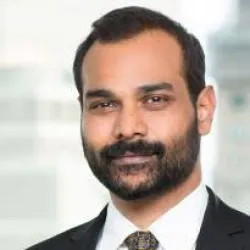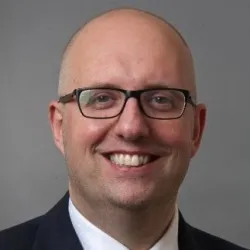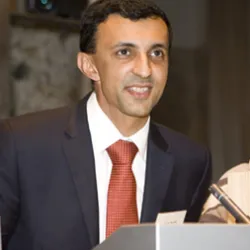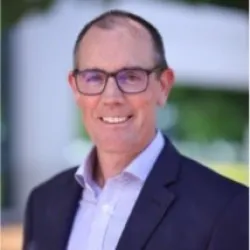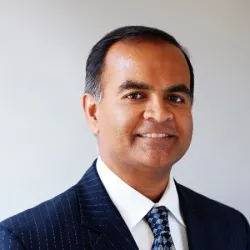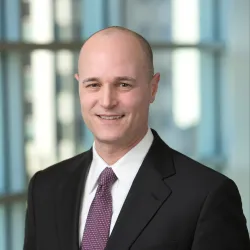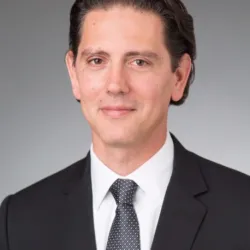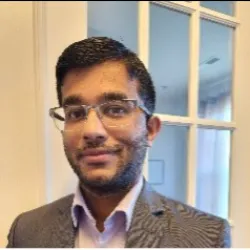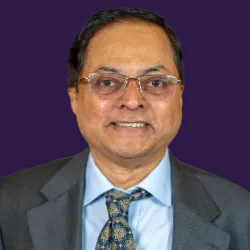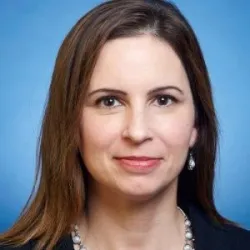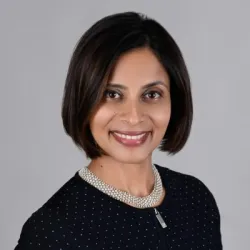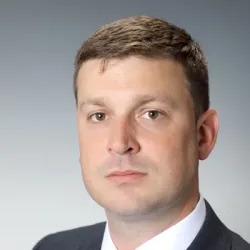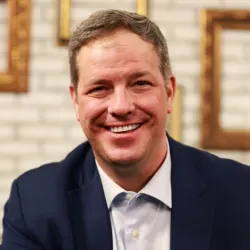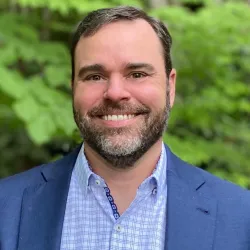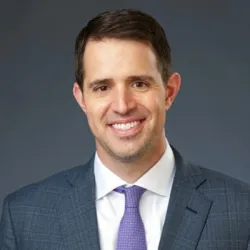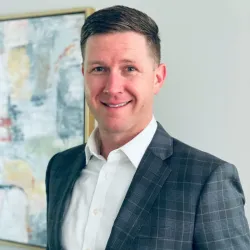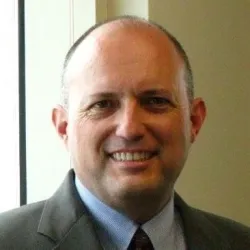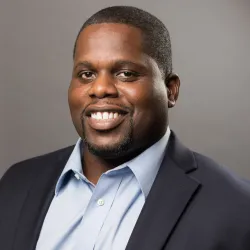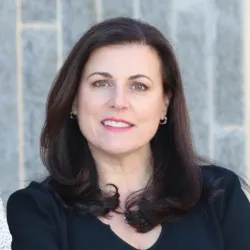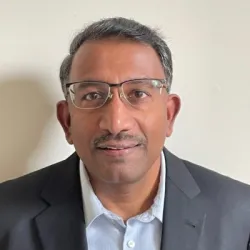Agenda
Agenda
Agenda
08:00 – 09:00
Registration and refreshments
13:10 - 14:00
09:00 – 09:10
Risk.net opening remarks
09:00 - 09:10
Kris Devasabai is the New York-based editor-in-chief of Risk.net. Previously, he was bureau chief and US editor of Risk magazine. He manages the editorial team. Prior to joining Risk, Kris covered hedge funds, asset management, cross-border investing and law for several publications.
Kris holds a bachelor’s degree in law and government from the University of Manchester, and he completed his legal training at the Inns of Court School of Law in London. He was called to the bar of England and Wales in 2003.
09:10 – 09:50
Fireside chat: Lisa White, Federal Reserve Bank of Richmond
Opening keynote
09:10 - 09:40
Lisa White
Executive vice president, supervision, regulation and credit
Federal Reserve Bank of Richmond
Lisa White was appointed executive vice president for Supervision, Regulation and Credit in 2017 with responsibility for managing supervisory risk and responding to regulatory and compliance issues for both the Fifth District and the Federal Reserve System.
White provides strategic leadership and direction for the Richmond Fed’s supervision of community, regional and large banks for the collection and validation of financial and structural data from firms, and for the provision of discount window services to depository institutions within the Fifth District.
White joined the Richmond Fed in 1995 and has served in several roles, including conducting community bank examinations, managing credit and market risk specialist teams and leading the examination team dedicated to Bank of America. She has also led the Richmond Fed’s supervisory program for large financial institutions, including Capital One, BB&T and E*TRADE.
She received her bachelor’s degree in economics and political science from Albion College and her master’s in business administration from Wake Forest University.
10:00 – 10:45
Performance under pressure: how risk teams thrive, and why they sometimes fail
Keynote panel
10:15 - 10:45
- How can teams and organizations thrive with greater demands on efficiencies?
- Rethinking team building, what does a successful team dynamic require?
- Where do things go wrong and how do you pivot for success?
Experienced Chief Risk Officer with a demonstrated history of working in the financial industry. Skilled in Banking, Regulatory Compliance, Internal Audit, Information Security, and Enterprise Risk Management. Certified banking professional with a Master of Business Administration (M.B.A.) focused in Economics and Finance.
Desireé has oversight and advisory for all risk types, establishment of risk frameworks, and execution of risk programs; as well as Operational monitoring.
Experience: 10+ years in financial services, including assurance activities, focused on risk and change management, system implementations, process design, and regulatory matters. Bachelor of Science in Accounting and Bachelor of Arts in Economics. CAMS and CIA certified.
Matthew Leatherman joined FCLT Global from North Carolina Department of State Treasurer where he served as Policy Director. Matthew contributed to the Department adopting a policy on long-term stewardship for approximately $100 billion of assets under its management and to updating practices for how staff incorporate longer-term factors into the evaluation of debt issued by local governments. He also was staff director of the Department’s Corporate Governance Committee, a body responsible for conducting the Department’s engagement with regulators, dialogue with corporate issuers, and voting of proxy ballots.
Matthew’s earlier career focused on U.S. fiscal research, most recently at the Stimson Center in Washington D.C. His commentary in outlets like Bloomberg Government was influential for understanding government shutdown and budget sequestration the terms of fiscal impact, management process, and the governance relationship between executive and legislative branches. Matthew advised the Rivlin-Domenici Debt Reduction Commission on military budgeting and management, including the structure of retirement and health care benefits for U.S. service-members. His fiscal research has been published by Foreign Affairs, International Herald Tribune, Washington Post, McClatchy-Tribune News Service, and other outlets.
Matthew is a Board member of the John Rex Endowment, a $75 million fund with a focus on improving mental health, preventing injury, and expanding access to healthy lifestyles for children in Wake County (NC). He is a term member of the Council on Foreign Relations and holds degrees from the University of North Carolina and Columbia University.
10:45 – 11:30
Morning networking break
10:45 - 11:30
11:30 – 12:00
What the Basel III endgame means for risk and capital modelling
11:30 - 12:00
Valerie Fontaine-Aubry is responsible for Murex's Market Risk practice in the Americas. Valerie has over 20 years capital markets experience and runs the FRTB practice, a central role to design, implementation and presales activities for Murex Americas. Valerie has worked with Murex clients across Europe, North America and Latin America, implementing technology solutions to future-proof capital markets businesses. She started at Murex as an interest rate derivatives consultant before founding and heading the Murex emerging markets team in New York.
Arthur is senior fellow and advisory board member for AI 2030. He is the former Head of Markets Regulatory and Front Office Risk Technology, BNY Mellon.
Tobias Krause, Senior Managing Director, is Head of Risk and Capital Optimization for State Street’s Global Markets division. Key areas of responsibilities include Market and Credit Risk management for State Street’s Foreign Exchange, Agency Lending, and Prime Services programs, along with Regulatory Affairs and Financial Resource Management for these businesses. Additionally, the team provides quantitative and qualitative support for financial resource management initiatives.
Mr. Krause joined State Street in early 2012. Before joining State Street, he served in the credit and collateral risk departments of Fidelity Investments’ Capital Markets division for eight years. Main focus areas included risk management for the firm’s prime brokerage and fixed income trading businesses.
Mr. Krause holds dual master’s degrees in finance and electrical engineering from the Technical University of Brunswick, Germany. He is a member of the CFA Institute, the Boston Security Analysts Society, and the Global Association of Risk Professionals.
12:00 – 12:30
Road to gold: How managed risk is leading USA Field Hockey to the Olympics
Panel discussion
12:00 - 12:30
What risk management frameworks are in place for USA Field Hockey?
How does the team mitigate unique challenges?
What practical takeaways can be applied to risk management in banking and finance?
How does the team mitigate unique challenges and prepare for the Paris 2024 Olympics?
David is the current Women’s National Field Hockey Head Coach who are based in Charlotte, North Carolina and recently won silver in the Pan American Games in Chile. Formerly a professor of Coaching Science & Education at Dublin City University David has applied the practical knowledge gained as a teacher, coach, coach developer and high performance director to various sporting contexts, business and academic areas of research. Before completing a professional doctorate David worked in elite sport for 14 years, formerly with British hockey before moving to Ireland where he coached the Irish Men’s team and served as High Performance Director with Hockey Ireland for 7 years. David then spent a period of 10 years in academia where his key research interests were culture building, coach development, talent development management processes, and applying science and data within the coaching process.
Father of 5 David also worked as lead consultant for Sport Ireland Institute in their elite coach development program, the Pursuit of Excellence within which he completed his doctorate in 2016. David is still actively involved in elite coach development working as a mentor on the European Top Coach Programme and as an Educator with the World Hockey Academy. David has been to two Olympics and former Ireland’s Men’s Head Coach and Women’s National Assistant Coach. David has worked as a consultant with several national and multinational companies drawing upon the close relationship between business and sport.
Simon Hoskins is the Executive Director of USA Field Hockey. He previously held the role of Chief Operating Officer (COO) at the organization, a position he had held since January 2013.
Hoskins joined USA Field Hockey in November of 2008 following roles in different sectors of the sports industry including England Rugby and the Premiership Rugby, the Vail Valley Foundation, and Major League Soccer. Hoskins is a graduate of the University of Oregon, and Loughborough University, England. Hoskins resides in Colorado with his wife and two children.
12:30 – 13:00
Embracing cutting-edge technology to upgrade risk management: what are the latest developments and how can they help?
12:30 - 13:00
What is the latest in risk tech and how does it work?
What are the benefits of working with third party risk providers?
What considerations should you have in place to ensure successful digital transformation?
(Moderated by Steve Boras)
Tanmoy is the Chief Risk Officer for Waterfall Asset Management a $12BN Hedge Fund specializing in Structured Credit in both Public and Private Markets. Prior to joining Waterfall, Tanmoy was the Head of Risk, North America and Senior Data Scientist at CQS, a $20BN Multi Strategy Credit Hedge Fund based out of US and Europe, where he managed Risk for the Credit Businesses and led Data Science projects for the Investment and Marketing Teams. Before CQS, Tanmoy worked at Axonic Capital, a $5BN Credit Hedge Fund where he was the Chief Risk Officer and the Head of Quantitative Research. Tanmoy has prior work experience at Sorin Capital and at Capital One. Tanmoy received a Master’s in Financial Engineering from Cornell University, an MBA from University of Delhi and a Bachelors in Chemical Engineering from Indian Institute of Technology.
Steve Boras is the Head of Model Risk Management & Validation at Citizens Bank in Boston, focused on managing the model risk of the bank via validation of models, performance management and monitoring of outcomes, and serving as a sounding board for new and emerging modeling techniques and their respective appropriateness. Since joining Citizens in 2015, Steve has led several risk analytics functions, most recently heading the Risk Architecture Center of Excellence (covering loss forecasting model development for CCAR/DFAST and CECL, and PD, LGD, and EAD modeling for wholesale), as well as anti-money laundering modeling, macroeconomic scenario generation, and Data Science. Steve also holds leadership roles in enterprise risk, ESG and Inflation/Stagflation scenario analysis, and artificial intelligence and machine learning governance.
13:00 – 14:15
Lunch break and networking
13:00 - 14:15
13:20 – 13:45
Risk.net editorial presentation
Subscriber roundtable
13:20 - 13:45
Duncan Wood is the London-based editor-in-chief of Risk.net. He was promoted to the role at the start of 2015, to lead the editorial reorganisation of the website and its print titles. Wood had been editor of Risk magazine since July 2011. He rejoined Risk as European editor in October 2009, having originally worked for Risk and Asia Risk in London and Hong Kong as a writer and researcher between 1998 and 2000.
In the intervening years, Wood was news editor for the Oliver Wyman-founded online start-up ERisk.com. He also worked freelance for six years while living in Germany, with his work featuring in Euromoney, Financial News, IFR, and The Wall Street Journal, as well as Risk magazine and its sister titles. Wood has written about derivatives and risk throughout his 17-year career in journalism. He is a Neal Awards finalist, and has won Incisive Media's journalist and editor of the year awards.
Kris Devasabai is the New York-based editor-in-chief of Risk.net. Previously, he was bureau chief and US editor of Risk magazine. He manages the editorial team. Prior to joining Risk, Kris covered hedge funds, asset management, cross-border investing and law for several publications.
Kris holds a bachelor’s degree in law and government from the University of Manchester, and he completed his legal training at the Inns of Court School of Law in London. He was called to the bar of England and Wales in 2003.
14:15 – 14:45
Embracing crisis as the new normal: Building bench strength to enhance resilience
14:15 - 14:45
- What have multiple recent crises taught us?
- How might our crisis intelligence be walking out the door of your organization?
- What approaches can executives take to beef up their preparedness to not lose the war when the next crisis emerges?
Mark S. Beasley is the Alan T. Dickson Distinguished Professor of Accounting and the Director of the Enterprise Risk Management Initiative in the Poole College of Management at North Carolina State University in Raleigh, North Carolina. The Enterprise Risk Management (ERM) Initiative at NC State provides thought leadership about ERM practices and their integration with strategy and corporate governance. As founding director, Dr. Beasley leads the ERM Initiative’s efforts to help pioneer the development of this emergent discipline through outreach to business professionals, with its ongoing ERM Roundtable Series and ERM Executive Education for boards and senior executives; research, advancing knowledge and understanding of ERM issues; and undergraduate and graduate business education for the next generation of business executives (www.erm.ncsu.edu). He frequently works with boards of directors and senior management teams to assist them in strengthening their risk oversight processes.
Dr. Beasley served on the board for the Committee of Sponsoring Organizations of the Treadway Commission (widely known at COSO – see www.coso.org) for seven years and has participated in a number of other national level risk management initiatives. He served on the Advisory Council that helped develop COSO’s initial Enterprise Risk Management – Integrated Framework issued in 2004, and he also worked with COSO on its 2017 revision of that framework. Currently, he is serving on the United Nations’ Internal Control Advisory Group that is advising the UN Controller on COSO-based best practices related to internal controls and he has conducted ERM training for management at the UN. He is a frequent speaker at national and international conferences on ERM, internal controls, and corporate governance.
His teaching interests include courses related to enterprise risk management, risks and controls, auditing, and financial reporting. Dr. Beasley is a member of NC State’s Academy of Outstanding Teachers, the College of Management’s recipient of the Board of Governor’s Teaching Award for the Poole College of Management, and a member of NC State’s Academy of Outstanding Faculty Engaged in Extension.
He has actively conducted research related to enterprise risk management and corporate governance, including examinations of ERM implementation, audit committee practices, financial statement fraud, and auditor quality. He has authored over 100 articles, monographs, thought papers, and books, including his research which has appeared in numerous academic journals including Journal of Accounting Research, The Accounting Review, Contemporary Accounting Research, Accounting Horizons, and Auditing: A Journal of Practice and Theory. He serves on the editorial boards of several academic journals, and he is the recipient of the American Accounting Association’s Competitive Manuscript Award, the AAA’s Distinguished Contribution to Accounting Literature Award, and the Auditing Section’s Notable Contributions to the Auditing Literature Award. Dr. Beasley also served as President of the AAA’s Auditing Section. In 2020, he was selected as the AAA Audit Section’s Outstanding Educator. He is the co-author of several education related materials, including an auditing-related textbook, casebook, practice reference manual, and CPE training materials.
Prior to beginning his career at NC State, Dr. Beasley served as a Technical Manager in the Audit and Attest Division of the AICPA. In that role he assisted the Auditing Standards Board in the development of professional auditing standards. Prior to joining the AICPA, he was an Audit Manager in the Nashville, Tennessee office of Ernst & Young.
Dr. Beasley is a member of the American Accounting Association (AAA) and the American Institute of Certified Public Accountants. He is currently serving on the Board of Directors of the AAA as Vice President – Finance. Dr. Beasley received a BS in accounting from Auburn University and a Ph.D. from Michigan State University.
Ericka F. Kranitz is a professor of practice in the Department of Accounting and the Director, Master of Management, Risk & Analytics Concentration in the Poole College of Management at NC State University working with the ERM Initiative and teaching accounting-related courses. Ms. Kranitz is also a lecturing fellow for the Fuqua School of Business teaching a risk management course as part of the Master of Science in Quantitative Management business analytics program. She previously worked for Duke University as an associate director of the Ethics and Compliance Program where she was responsible for compliance assurance reviews and managing ethical-related activities.
Previously, Ms. Kranitz was with the University of Missouri System where she was responsible for identifying, developing and delivering training for sponsored programs and other financial related compliance requirements for all four campuses. While at the System, she was an adjunct instructor in the Trulaske School of Accountancy and Harry S. Truman School of Public Affairs on the University of Missouri campus. Prior to this, she was the director of internal audit for NC State University in Raleigh. In this role, she transformed the internal audit division into a consultative and value-added function and implemented best practices. During this time, she was also an adjunct instructor in the departments of accounting and public administration.
Ms. Kranitz received both her bachelor’s and master’s in accounting degrees from the University of Missouri – Kansas City. Her professional experience also includes working at Ernst & Young LLP, Chiquita Brands International, a global pharmaceutical company and consulting with local nonprofit organizations in the areas of governance and financial management.
14:45 – 15:15
Top three fallacies of risk measurement
Presentation
14:45 - 15:15
How investors often mismeasure risk to focus on end-of-horizon outcomes, despite the fact that they perceive it continuously through the horizon
How investors misunderstand the divergence between short – and long-term risk and diversification properties
How investors fail to detect asymmetric correlations and how this leads to underestimating risk
Practical tools to detect shifting risk regimes
Critical mistakes investors make when estimating the risk of private assets
Will is Senior managing director and Head of research at State Street Global Markets, the capital markets business at State Street, where he is responsible for a global team of 50 data scientists, quantitative researchers and macro investment strategists as well as managing partnerships with data science startups and academics. The team delivers proprietary investment indicators, data-driven trade ideas, and award-winning research to thousands of institutional investors around the world through its Insights platform.
Will’s personal research has focused on recession forecasting, private equity investing, asset allocation, inflation and risk measurement. He and his co-authors received “outstanding article” awards for their research in 2013, 2014, 2015, 2016 and 2021. The second edition of his book, “Asset Allocation: From Theory to Practice and Beyond,” co-authored with Mark Kritzman and David Turkington, was published in 2021. He also serves on the editorial boards of the Journal of Portfolio Management and the Journal of Alternative Investments. He holds an M.S. in finance from Boston College, a B.A. in economics from Tufts University, and a CFA designation.
15:15 – 15:45
Afternoon networking break
15:15 - 15:45
15:45 – 16:15
Beyond the horizon: modeling and identifying big risks earlier
Keynote panel
15:45 - 16:15
How can risk functions adopt a faster, more rigorous and sophisticated risk identification process to prepare against today’s top risks? And what has hindered banks from applying lessons from similar events in the past?
Should we be taking the risk of non-bank financial institutions and cryptocurrency more seriously? Could they pose the next big, ‘over-the-horizon' risks?
How to pinpoint and fix model flaws at every stage of the lifecycle
Will we ever be able to take the ‘risk’ out of risk modelling?
Aleksey Leksanov has been leading Model Risk Management at Mizuho USA since December of 2022. Prior to the latest move he spent 8 year at Deutsche Bank where he lead Americas Model Validation Team and worked as an IB strat. Before joining DB Aleksey was a Portfolio Manager/ Investment Analyst and lead Model development at Apollo (via acquisition of Stone Tower Capital). Prior to his start on Wall Street in 2004 Aleksey worked at Hughes Network System as an embedded software engineer. He graduated from the Pennsylvania State University in 2000 with PhD in Physics.
As founding Executive Director, Dr. Doug Hague established the vision for the School of Data Science, as well as manages its resources, programs, and serves as the representative to the UNC Charlotte community and external industry partners.
Dr. Hague has more than 20 years of experience in global technology. Before joining UNC Charlotte, he served as the Chief Analytics Officer at Bank of America Merchant Services, where he implemented data governance policies and practices for internal and external entities. Prior to Bank of America Merchant Services, he held multiple roles at Bank of America, Sprint, and United Technologies.
Dr. Hague earned a bachelor’s degree in Engineering Physics from the University of Tulsa, a master’s degree in System Design and Management from MIT, and a Ph.D in Materials Science and Engineering from Penn State University.
George Soulellis currently serves as Enterprise Model Risk Officer for Freddie Mac with overall responsibility for model risk management in the firm. Previously, he served as Managing Director, Risk Analytics for Barclays Bank in the UK, overseeing risk model development and analytics. He has also held leadership positions in the risk management/modelling/analytics space at Citigroup, General Electric and JP Morgan Chase. His interests primarily lie in model uncertainty measurement, model risk under conditions of extrapolation, machine learning methods and modelling for capital requirements.
Tanmoy is the Chief Risk Officer for Waterfall Asset Management a $12BN Hedge Fund specializing in Structured Credit in both Public and Private Markets. Prior to joining Waterfall, Tanmoy was the Head of Risk, North America and Senior Data Scientist at CQS, a $20BN Multi Strategy Credit Hedge Fund based out of US and Europe, where he managed Risk for the Credit Businesses and led Data Science projects for the Investment and Marketing Teams. Before CQS, Tanmoy worked at Axonic Capital, a $5BN Credit Hedge Fund where he was the Chief Risk Officer and the Head of Quantitative Research. Tanmoy has prior work experience at Sorin Capital and at Capital One. Tanmoy received a Master’s in Financial Engineering from Cornell University, an MBA from University of Delhi and a Bachelors in Chemical Engineering from Indian Institute of Technology.
16:15 – 16:45
AI at Ally: tech insights from the CRO and CIO
Afternoon keynote
16:15 - 16:45
Two C-level executives from Ally Financial join Risk.net’s editorial director to discuss the fast-growing lender’s embrace of artificial intelligence – the opportunities it sees, and the risks it has to manage.
Duncan Wood is the London-based editor-in-chief of Risk.net. He was promoted to the role at the start of 2015, to lead the editorial reorganisation of the website and its print titles. Wood had been editor of Risk magazine since July 2011. He rejoined Risk as European editor in October 2009, having originally worked for Risk and Asia Risk in London and Hong Kong as a writer and researcher between 1998 and 2000.
In the intervening years, Wood was news editor for the Oliver Wyman-founded online start-up ERisk.com. He also worked freelance for six years while living in Germany, with his work featuring in Euromoney, Financial News, IFR, and The Wall Street Journal, as well as Risk magazine and its sister titles. Wood has written about derivatives and risk throughout his 17-year career in journalism. He is a Neal Awards finalist, and has won Incisive Media's journalist and editor of the year awards.
Jason Schugel was named chief risk officer for Ally Financial in the spring of 2018. He has overall responsibility for execution of Ally’s Independent risk management. He has responsibility for the enterprise risk management framework, establishment of risk management processes, an ensuring that Ally targets an appropriate balance between risk and return, mitigating unnecessary risk and protecting the company’s financial returns.
Schugel was previously deputy chief risk officer for the company since 2017, leading various risk-management activities. Prior to that role, he was general auditor for Ally, responsible for the company's internal audit function as well as administrative oversight for Ally's loan review function.
Schugel joined Ally in 2009, overseeing the company’s financial planning and analysis team, which is responsible for Ally’s financial performance reporting, enterprise-wide forecasting and planning. He also served as lead finance executive for Ally's global functions. Before joining Ally, he was vice president of financial planning and analysis, and investor relations at LendingTree, LLC. Prior to that, he worked in investment banking for Wachovia and began his career at First Plus Financial, specializing in mergers and acquisitions.
He earned a bachelor’s degree in business administration from Southern Methodist University in Dallas and a master’s degree in business administration from the Babcock Graduate School of Management at Wake Forest University. Schugel is the Chairman of the board of the Allegro Foundation, an organization that is a champion for children with disabilities. He also volunteers regularly with Charlotte Rescue Mission organization, which helps people struggling with the disease of addiction achieve long-term sobriety, find employment and stable housing.
Sathish Muthukrishnan is chief information officer. He was named chief information, data and digital officer for Ally Financial Inc. in December 2019. In this role, Muthukrishnan is responsible for advancing Ally’s technical and digital capabilities, including cyber security and infrastructure, and accelerating the company’s growth and evolution as a leader in the digital financial services sector. He is based in Ally’s Charlotte corporate center and reports to Ally CEO Jeffrey J. Brown.
Muthukrishnan has held a number of senior technology leadership roles with substantial scale and global reach, and previously served as the chief digital and information officer for Honeywell Aerospace, a nearly $14 billion revenue business within Honeywell International. He brings to Ally more than 20 years of technology leadership experience in complex businesses with high availability and reliability requirements on their technology, ten of which were spent in financial services with American Express prior to joining Honeywell.
Muthukrishnan graduated from University of Madras with a degree in engineering specializing in computer science. He is a member of the Advisory Board of WIT International and was recipient of the Chairman’s Award for Innovation for several years at American Express. Muthukrishnan has over 25 filed patents in the manufacturing, payments and the digital technology space.
16:45 – 17:25
Looking ahead to the 2024 election and environmental risk: What impact could macroeconomic and geopolitical conditions have on market risk?
Closing keynote
16:45 - 17:25
How can we prepare against macroeconomic conditions, and what will be the effect of the election on market risk?
What are the top geopolitical market risks and how do we stay ahead?
What risk management tools are the most effective to inform strategy and business decision-making in the face of these risks?
Ronald Ratcliffe, PhD, is a Managing Director in BlackRock’s Applied Portfolio Analysis practice area within the Analytics & Quantitative Solutions (AQS) group. He focuses on multi-asset portfolio risk, scenario analysis, and portfolio construction.
Dr. Ratcliffe's service with BlackRock dates back to 2004, including his years with Barclays Global Investors (BGI), which merged with BlackRock in 2009. Prior to joining AQS, he led the Market-Driven Scenarios (MDS) initiative as Head of Cross-Platform Scenario Analysis in the Risk & Quantitative Analysis (RQA) group. Previously in RQA, he was Head of Multi-Asset Investment Risk for the Americas West region. In the Portfolio Management Group (PMG), he was a portfolio manager and developed systematic macro trading strategies. Prior to joining BGI, Dr. Ratcliffe was a senior manager at KPMG in corporate valuation and international transfer pricing. Previously, he was the chief economist for Latin America at SG Cowen Securities, a subsidiary of Societe Generale. Before that he was with Bankers Trust Company (now part of Deutsche Bank) where he carried out country risk analysis.
Dr. Ratcliffe earned BA degrees in economics and in political science, with distinction and with departmental honors in economics, from Stanford University. He received a PhD in economics from the University of Pennsylvania.
As founding Executive Director, Dr. Doug Hague established the vision for the School of Data Science, as well as manages its resources, programs, and serves as the representative to the UNC Charlotte community and external industry partners.
Dr. Hague has more than 20 years of experience in global technology. Before joining UNC Charlotte, he served as the Chief Analytics Officer at Bank of America Merchant Services, where he implemented data governance policies and practices for internal and external entities. Prior to Bank of America Merchant Services, he held multiple roles at Bank of America, Sprint, and United Technologies.
Dr. Hague earned a bachelor’s degree in Engineering Physics from the University of Tulsa, a master’s degree in System Design and Management from MIT, and a Ph.D in Materials Science and Engineering from Penn State University.
17:25 – 18:25
Networking drinks
17:30 - 19:30
08:00 – 09:00
Registration and refreshments
13:10 - 14:00
09:10 – 09:50
Keynote session on Risk management stage
09:10 - 09:50
09:50 – 09:55
Risk.net Op risk opening remarks
09:00 - 09:05
- Evan G. Sekeris is chief model risk officer with Capital One, based in Washington, D.C. His areas of focus are stress testing, operational risk, and cyber risk. Evan’s background is in the measurement and quantification of credit risk and operational risk. His primary focus is currently on supporting institutions in building stress testing frameworks, developing their risk identification process and developing their model risk management frameworks.
- His projects include:
- Supporting a wide range of large global and regional banks with their CCAR frameworks, with a particular emphasis on their non financial risks.
- Developed a cyber risk quantification framework for a number of clients including a global financial institution and a fortune 250 industrial.
- Assessment and redevelopment of risk operating models and of 3LoD frameworks for various large global and regional banks.
- For a large internationally active US bank: supported major change of course in CCAR operational risk stress estimates a few months prior to submission in reaction to regulatory guidance.
- Supported the development of operational risk models for capital and stress testing purposes at more than 20 institutions worldwide.
- Previously, Evan was with MUFG, Oliver Wyman, and Aon in Columbia, Maryland, and assistant vice president of the Federal Reserve Bank of Richmond, where he created the center of excellence for operational risk which served the system needs for operational risk related matters. The team was in charge of the supervision of all AMA and CCAR banks in the US and developed the Fed’s CCAR model for operational risk.
- Evan earned a B.A. and M.A. in Economics from the Université Catholique de Louvain in Belgium. He received his Ph.D. in Economics from the University of California at Los Angeles.
- He has numerous publications in both academic and practitioner journals
- Evan is an editor of the Journal of Operational Risk
09:55 – 10:30
Managing data risks in modern financial institutions
09:05 - 09:45
-
Data transmission: upstream and downstream data transportation and regulation.
-
Data governance and quality: Ensuring accuracy and reliability.
-
Leveraging technology: Tools and platforms to manage and monitor data risks.
-
Tools in the market – software for monitoring – the concept of compliance as a service.
Philip Alexander is the regulation desk editor for Risk.net, overseeing a team of journalists in the UK, US and Asia. He was previously senior editor at The Banker magazine, covering financial regulation, capital markets, derivatives and central and eastern Europe.
Prior to entering journalism, Alexander edited sovereign credit research for rating agency Standard & Poor’s in London. He was awarded a PhD in modern history by the University of Cambridge for a thesis on Britain and European integration.
Badri Iyengar
Senior vice president, global technology compliance and operational risk
Bank of America
Badri is a forward-thinking operational risk executive with over 15 years of experience in the financial services industry. As a senior vice president, operational risk executive, Badri is accountable for the effective execution of the bank’s operational risk programme for the global technology organisation. As part of this role, he and his team provide oversight of key operational risks including data risk, cybersecurity, resiliency, technical change across global technology CIO organisations. Badri has a proven track record of developing and implementing comprehensive risk management strategies that safeguard organisational assets, enhance regulatory compliance, and optimise operational efficiency. Prior to this role, Badri served as the operational risk lead for the consumer and small business organisation with a focus on implementing the operational risk programme and strategies across consumer products and services, including but not limited to, credit card, ATM/online banking, first mortgage and home equity. Badri joined Bank of America in 2010 in the global risk management organisation and has since then served on multiple credit and operational risk roles. He received his B.S. degree in electrical engineering from VIT University, India and earned his Master’s degree in mathematical finance from University of North Carolina, Charlotte.
Vinod is an Associate Partner at McKinsey & Company, based in Charlotte, where he is a member of the banking practice. He serves Financial Services firms and fintech on a broad range of data, risk, finance, operations, and technology-related issues.
10:30 – 11:05
Op risk and model risk: rethinking their relationship in the AI era
09:45 - 10:20
-
AI's disruption through its inherent intricacies is elevating model risk concerns.
-
The case for distinction: does challenges posed by AI-driven models necessitate a separate risk category?
-
Regulatory implications: would regulations for AI-driven model risk be any different than present?
-
Best practices for banks and financial institutions to manage and monitor AI-induced model risks.
- Evan G. Sekeris is chief model risk officer with Capital One, based in Washington, D.C. His areas of focus are stress testing, operational risk, and cyber risk. Evan’s background is in the measurement and quantification of credit risk and operational risk. His primary focus is currently on supporting institutions in building stress testing frameworks, developing their risk identification process and developing their model risk management frameworks.
- His projects include:
- Supporting a wide range of large global and regional banks with their CCAR frameworks, with a particular emphasis on their non financial risks.
- Developed a cyber risk quantification framework for a number of clients including a global financial institution and a fortune 250 industrial.
- Assessment and redevelopment of risk operating models and of 3LoD frameworks for various large global and regional banks.
- For a large internationally active US bank: supported major change of course in CCAR operational risk stress estimates a few months prior to submission in reaction to regulatory guidance.
- Supported the development of operational risk models for capital and stress testing purposes at more than 20 institutions worldwide.
- Previously, Evan was with MUFG, Oliver Wyman, and Aon in Columbia, Maryland, and assistant vice president of the Federal Reserve Bank of Richmond, where he created the center of excellence for operational risk which served the system needs for operational risk related matters. The team was in charge of the supervision of all AMA and CCAR banks in the US and developed the Fed’s CCAR model for operational risk.
- Evan earned a B.A. and M.A. in Economics from the Université Catholique de Louvain in Belgium. He received his Ph.D. in Economics from the University of California at Los Angeles.
- He has numerous publications in both academic and practitioner journals
- Evan is an editor of the Journal of Operational Risk
Judith joined DWS (formerly known as Deutsche Asset Management) in 2005 following 8 years with JPMorgan Chase. Prior to her current role as head of non-financial risk management & programmes, Judith was the chief risk officer for DWS Americas, she served as the regional control officer for DWS Americas. Before that, she was the global chief operating officer for the DWS Alternatives and Fund Solutions business based in London.
Judith holds an MBA in Financial Management from Pace University, New York.
11:05 – 11:40
Auditing the future: best practices for Gen AI and advanced machine learning
10:20 - 10:55
-
Explore the newest audit tools and methodologies for AI and ML auditing.
-
Risk, tech, audit, employee training – educating against the dangers.
-
Nullifying responsibility of human error through AI use.
-
Ownership and governance over automation.
-
AI’s use by shadow IT.
Philip Alexander is the regulation desk editor for Risk.net, overseeing a team of journalists in the UK, US and Asia. He was previously senior editor at The Banker magazine, covering financial regulation, capital markets, derivatives and central and eastern Europe.
Prior to entering journalism, Alexander edited sovereign credit research for rating agency Standard & Poor’s in London. He was awarded a PhD in modern history by the University of Cambridge for a thesis on Britain and European integration.
Ilieva Ageenko is an accomplished senior executive in Fortune 100 companies and trusted advisor to board of directors and CEOs of startups and private businesses on the strategic use of analytics and technology innovation.
Ilieva is formerly a managing director for Truist Financial Corporation. She oversaw data analytics and innovation function for audit services. Since being named to this position in February, 2020, Ageenko accelerated the use of enabling technologies and analytics for audit execution. With 30 years of banking experience, she previously served as national advisory practice leader for model risk management at Grant Thornton where she provided advisory services the largest global banks (2014-2019), head of quantitative credit risk technology at Bank of America (2010-2014), e-commerce mobile payments executive at Bank of America (2009-2010) and e-commerce executive at Wells Fargo (2003-2009).
Ilieva is on the board of directors at a Lake Norman Community Health Clinic that provides services to uninsured families and is on the advisory board for modal (an online learning platform). Ageenko earned a Master's in Economics Cybernetics from the State University of Management, Moscow and a PhD in Artificial Intelligence from the University of Kiev, and a Certification in Corporate Governance from Wharton School.
11:40 – 12:00
Networking refreshments break
10:55 - 11:50
12:00 – 12:35
Optimising cyber defences in finance: best practices and strategic choices
11:50 - 12:30
- Integrated defence strategies: From technical defences to employee training.
- Cloud security considerations: Establishing a robust cloud strategy that addresses risk concentration and ensures resilience.
- Role of cyber insurance: Assessing cyber insurance as a component of a multi-layered defence strategy. Is it a necessary safety net for today's financial institutions?
- Worming their way in: Evaluating the pros and cons of offshore IT outsourcing in the context of cybersecurity vulnerabilities and operational efficiency.
Evan Wheeler, senior director, leads the risk identification and assessment team within technology risk management at Capital One. Evan got his start in cybersecurity working with the U.S. Department of Defense in a Security Operations Center (SOC) and has since held several executive level cybersecurity and operational risk management roles at global organizations such as MUFG Union Bank, Depository Trust & Clearing Corporation (DTCC), and various fintech firms. At MUFG, Evan designed and implemented a new second line information risk management programme, focusing on harmonising the tech/cyber assessments with the enterprise risk framework, and deploying a data driven methodology to quantify risk for IT processes. Evan originally joined the DTCC with responsibility for developing a risk framework for the cyber organisation, and later moved on to oversee second line operational risk management for 10 diverse lines of business, subsidiaries, and joint ventures. Along the way, he drove major initiatives such as a migration to AWS, implementing DDoS protection, dynamic application security testing, and privileged access control. During his tenure at DTCC, Evan was actively involved with cross-sector initiatives through the FSSCC and FS-ISAC.
Chris is a member of Milliman’s Cyber Risk Solutions (CRS) practice group. The practice delivers a portfolio of risk consulting services, such as enterprise risk design, cyber risk assessment and quantification, test and build projects, operational risk assessments, enterprise risk management (ERM) education and training, and ERM technology evaluation. The CRS practice uses diagnostic consulting strategies to understand an organization’s enterprise risk goals and challenges and then customize solutions to deliver required business results.
EXPERIENCE
Chris has 15 years of professional experience. His experience includes work in the banking, insurance, capital markets and card sectors helping clients assess and mitigate risk.
Prior to joining Milliman, Chris was a Senior Manager in Accenture’s Finance and Risk Management Consulting practice, delivering work for global financial service clients. Additionally, Chris served as an active duty Naval Officer and has multiple overseas deployments.
Professional experience and subject matter advisory includes:
- Cyber Security metrics and governance
- Financial Service Regulatory and Compliance initiatives
- Risk Management
- Corporate and Risk Governance
- Surveillance
- Financial Services operating model and cost reduction
- Regulatory remediation and responses
- Legal department risk and optimization
- Leading large cross functional projects and teams
EDUCATION
- BS Political Science, University of Wisconsin–Madison
- MBA, University of Chicago – Booth School of Business
12:35 – 13:10
Op risk and GRC: navigating the digital transformation in an ESG context
12:30 - 13:10
-
Data-driven risk management in leveraging analytics for proactive risk mitigation.
-
GRC platforms enabling streamlining compliance in an evolving landscape.
-
Need for more diverse, well-rounded candidates in data and IT.
-
Defining and practically implementing changes to reach ESG goals.
Mark Hofberg is an accomplished risk management leader with over 20 years of industry experience. He previously served as a leader in a variety of audit, risk and compliance management functions within retail, wealth, and investment banking at Bank of America. Mark currently serves customers as Risk Solutions Executive within ServiceNow’s financial services division. Prior to joining ServiceNow, Mark served as RSA Archer’s field risk officer for US and Canada.
Mark has held various senior leadership roles at Accenture, Bank of America, RSA and now guides customers on their integrated risk transformation journeys with ServiceNow. He is passionate about the evolution of risk management, emerging risks, and the utilization of technology to optimize business outcomes. Mark has co-authored white papers on impacts of technical debt, digital risk, and has a patent on optimization of technology decisions (US 8,321,363 · Issued Nov 27, 2012) along with a patent pending process risk prioritization model. Mark holds a bachelor’s degree in engineering from North Carolina State University.
Tripp Rex is the operational risk framework executive at U.S. Bank, which encompasses the RCSA, internal control and control testing, product delivery risk, operational loss, scenario analysis and issue management. Since joining U.S. Bank in 2014, Tripp has led functions within technology risk, control testing, and technology strategy for risk management. Prior to U.S. Bank, he held prior roles in risk and programne management at Bank of America. Prior to that, Tripp worked at Accenture in management consulting supporting various financial institutions. Tripp is an alumni of Clemson University and received his MBA from the University of South Carolina.
Judith joined DWS (formerly known as Deutsche Asset Management) in 2005 following 8 years with JPMorgan Chase. Prior to her current role as head of non-financial risk management & programmes, Judith was the chief risk officer for DWS Americas, she served as the regional control officer for DWS Americas. Before that, she was the global chief operating officer for the DWS Alternatives and Fund Solutions business based in London.
Judith holds an MBA in Financial Management from Pace University, New York.
13:10 – 14:00
Lunch break and Op risk networking
13:05 - 14:00
13:20 – 13:55
Operational resilience in the digital age
Op Risk Roundtable Breakout session 1- In the Op Risk room
11:05 - 11:45
-
Regulatory readiness: current and upcoming regulatory requirements impact digital operations – How to comply without compromising service innovation.
-
The human element: The critical role of human oversight amidst automation, ensuring that human judgement remains inbuilt into the culture and processes of resilience, not just the technology.
Elevating operational risk management: the power of data standards and controls
Op Risk Roundtable Breakout session 2- In the AI room
13:20 - 13:55
This session addresses the crucial role of data standards and controls.
Desireé has oversight and advisory for all risk types, establishment of risk frameworks, and execution of risk programs; as well as Operational monitoring.
Experience: 10+ years in financial services, including assurance activities, focused on risk and change management, system implementations, process design, and regulatory matters. Bachelor of Science in Accounting and Bachelor of Arts in Economics. CAMS and CIA certified.
14:00 – 14:35
Privacy in the financial world: balancing security with user rights
14:00 - 14:35
-
Regulatory implications: GDPR, CCPA, and other global privacy laws.
-
Privacy by design: Incorporating privacy considerations into product design.
-
Case studies: Lessons learned from privacy breaches in the financial world.
-
Vendor risk management: ensuring your partners respect privacy too.
14:35 – 15:15
Balancing innovation and integrity: banks, fintechs, and the new frontier of risk management
14:35 - 15:15
-
Evolving landscape of TPRM: strategies for traditional banks to stay relevant, competitive, and resilient amidst the fintech revolution.
-
How much risk should traditional banks accept as they integrate with or compete against fintechs?
-
How can banks stay competitive when fintechs might operate without the same regulatory burdens or legacy systems? Are there inherent advantages that banks can leverage?
-
As fintechs blur the boundaries of traditional financial services, can regulators keep up? How are regulatory bodies adapting, and what should banks anticipate in terms of regulatory changes?
-
How to bridge the gap between Fis and FinTech to meet the demands of consumers?
15:15 – 15:20
Risk.net Op Risk closing remarks
15:15 - 15:20
- Evan G. Sekeris is chief model risk officer with Capital One, based in Washington, D.C. His areas of focus are stress testing, operational risk, and cyber risk. Evan’s background is in the measurement and quantification of credit risk and operational risk. His primary focus is currently on supporting institutions in building stress testing frameworks, developing their risk identification process and developing their model risk management frameworks.
- His projects include:
- Supporting a wide range of large global and regional banks with their CCAR frameworks, with a particular emphasis on their non financial risks.
- Developed a cyber risk quantification framework for a number of clients including a global financial institution and a fortune 250 industrial.
- Assessment and redevelopment of risk operating models and of 3LoD frameworks for various large global and regional banks.
- For a large internationally active US bank: supported major change of course in CCAR operational risk stress estimates a few months prior to submission in reaction to regulatory guidance.
- Supported the development of operational risk models for capital and stress testing purposes at more than 20 institutions worldwide.
- Previously, Evan was with MUFG, Oliver Wyman, and Aon in Columbia, Maryland, and assistant vice president of the Federal Reserve Bank of Richmond, where he created the center of excellence for operational risk which served the system needs for operational risk related matters. The team was in charge of the supervision of all AMA and CCAR banks in the US and developed the Fed’s CCAR model for operational risk.
- Evan earned a B.A. and M.A. in Economics from the Université Catholique de Louvain in Belgium. He received his Ph.D. in Economics from the University of California at Los Angeles.
- He has numerous publications in both academic and practitioner journals
- Evan is an editor of the Journal of Operational Risk
15:45 – 17:00
Afternoon networking break & closing sessions on Risk management stage
15:45 - 17:00
17:00 – 19:00
Move to Risk management stage for keynotes and networking drinks
15:20 - 19:00
08:00 – 09:00
Registration and refreshments
13:10 - 14:00
09:00 – 11:30
Keynote sessions on Risk management and Op risk stages
09:00 - 11:30
11:30 – 12:00
Bias, responsibility and AI risk management
12:00 - 12:30
Opening Keynote
Where does generative AI bias stem from? And what do these biases manifest as?
Who owns the responsibility for AI?
Common mistakes and lessons learned for improved AI risk management.
Steve Boras is the Head of Model Risk Management & Validation at Citizens Bank in Boston, focused on managing the model risk of the bank via validation of models, performance management and monitoring of outcomes, and serving as a sounding board for new and emerging modeling techniques and their respective appropriateness. Since joining Citizens in 2015, Steve has led several risk analytics functions, most recently heading the Risk Architecture Center of Excellence (covering loss forecasting model development for CCAR/DFAST and CECL, and PD, LGD, and EAD modeling for wholesale), as well as anti-money laundering modeling, macroeconomic scenario generation, and Data Science. Steve also holds leadership roles in enterprise risk, ESG and Inflation/Stagflation scenario analysis, and artificial intelligence and machine learning governance.
12:00 – 12:30
Safeguarding control over AI: How to manage AI and its potential risks
12:30 - 13:00
-
What are the prominent risks associated with AI in banking?
-
What are the most recent and emerging regulations for real-time monitoring of AI, and are they realistic?
-
How can risk functions upskill themselves to manage AI better?
Dr. Beju Rao, PhD, is a distinguished figure in the field of Artificial Intelligence (AI). As the Founder, President, and CEO of Amruta Inc, he has been instrumental in designing and implementing Explainable AI (XAI) software and services. These solutions have been pivotal in enhancing revenue, profitability, safety, compliance, and reputation across various corporations, agencies, and organizations worldwide. Dr. Rao’s XAI-based solutions address the opacity and complexity of AI, yielding a remarkable 25-fold return on investment. His career, spanning over 36 years, is marked by a consultative approach that involves situation assessment, precise needs identification, organizational readiness preparation, and information-based strategies. This approach has empowered numerous enterprises to reap innovative and significant business benefits.
Before establishing Amruta Inc in June 2014, Dr. Rao held the position of Founding-Principal and Chief Scientist at Axtria, Inc. He also served in various risk management roles at Capital One, including as the Omnibus Model Risk Officer during the Great Recession. In addition to his corporate achievements, Dr. Rao has made significant contributions to academia as an Adjunct Professor at several universities. His research and innovation have been recognized with three patents and over 100 external and internal publications. Dr. Rao is a sought-after speaker and producer on topics such as innovating with AI without its risks, outsmarting AI, AI guardrails, and AI-based economic and digital transformations. He also serves on the advisory board of FinRegLab, among other community and volunteer activities. Dr. Rao holds a PhD in Industrial Engineering and Operations Research from Texas A&M University. His work continues to influence the field of AI, shaping its future while mitigating its risk.
Steve Boras is the Head of Model Risk Management & Validation at Citizens Bank in Boston, focused on managing the model risk of the bank via validation of models, performance management and monitoring of outcomes, and serving as a sounding board for new and emerging modeling techniques and their respective appropriateness. Since joining Citizens in 2015, Steve has led several risk analytics functions, most recently heading the Risk Architecture Center of Excellence (covering loss forecasting model development for CCAR/DFAST and CECL, and PD, LGD, and EAD modeling for wholesale), as well as anti-money laundering modeling, macroeconomic scenario generation, and Data Science. Steve also holds leadership roles in enterprise risk, ESG and Inflation/Stagflation scenario analysis, and artificial intelligence and machine learning governance.
Amitabh Bhargava spearheads the Credit Portfolio Management practice at SRA Consulting (SRA). His expertise lies in creating value for both wholesale and consumer lending businesses.
Amitabh's role at SRA involves assisting clients in establishing, evaluating, and refining credit risk strategies, risk governance, portfolio structures, risk appetites, limit structures, and data strategies. Amitabh’s responsibilities include developing credit cycle dashboards, downturn preparedness strategies, portfolio risk mitigation tools, ESG/sustainability strategies, and model calibration processes that span risk rating, pricing, CECL, and stress testing models.
He leverages data analytics to advise credit investors on identifying forward-looking indicators within an economic, sectoral, and competitive analytical framework.
Amitabh oversaw credit analytics and research for Capital One's wholesale portfolio in his most recent role. He identified emerging risks and influenced critical risk acceptance and avoidance decisions. During his tenure at Capital One, he supervised executive credit risk assessment, Risk MIS development, rating agency communication, BOD communication, and portfolio modeling for wholesale and retail portfolios.
Amitabh began his career as a commercial underwriter and relationship manager at ICICI Bank, India. Here, he conducted techno-financial and economic appraisals and underwriting from an investment perspective and developed pricing and capital allocation tools.
He holds several certifications, including "Sustainability and Climate Risk professional" and "Financial Risk Manager" from the Global Association of Risk Professionals (GARP). He is also a Credit Risk Certified (CRC) professional from RMA, a CFA Charter holder, and a Board member of RMA Richmond.
Amitabh has served as the past president of the Richmond Association of Business Economics and was a member of the Regulatory Steering Committee of the International Association of Credit Portfolio Managers. He holds a B-Tech Degree in Electrical Engineering from IIT Delhi (India), and an MBA from XLRI Jamshedpur (India).
12:30 – 13:00
Deep dive: Mastering AI models for future-ready finance
13:20 - 13:55
This session will be a detailed exploration of the creation, implementation, and governance of AI models within the financial sector.
- Evan G. Sekeris is chief model risk officer with Capital One, based in Washington, D.C. His areas of focus are stress testing, operational risk, and cyber risk. Evan’s background is in the measurement and quantification of credit risk and operational risk. His primary focus is currently on supporting institutions in building stress testing frameworks, developing their risk identification process and developing their model risk management frameworks.
- His projects include:
- Supporting a wide range of large global and regional banks with their CCAR frameworks, with a particular emphasis on their non financial risks.
- Developed a cyber risk quantification framework for a number of clients including a global financial institution and a fortune 250 industrial.
- Assessment and redevelopment of risk operating models and of 3LoD frameworks for various large global and regional banks.
- For a large internationally active US bank: supported major change of course in CCAR operational risk stress estimates a few months prior to submission in reaction to regulatory guidance.
- Supported the development of operational risk models for capital and stress testing purposes at more than 20 institutions worldwide.
- Previously, Evan was with MUFG, Oliver Wyman, and Aon in Columbia, Maryland, and assistant vice president of the Federal Reserve Bank of Richmond, where he created the center of excellence for operational risk which served the system needs for operational risk related matters. The team was in charge of the supervision of all AMA and CCAR banks in the US and developed the Fed’s CCAR model for operational risk.
- Evan earned a B.A. and M.A. in Economics from the Université Catholique de Louvain in Belgium. He received his Ph.D. in Economics from the University of California at Los Angeles.
- He has numerous publications in both academic and practitioner journals
- Evan is an editor of the Journal of Operational Risk
Ilieva Ageenko is an accomplished senior executive in Fortune 100 companies and trusted advisor to board of directors and CEOs of startups and private businesses on the strategic use of analytics and technology innovation.
Ilieva is formerly a managing director for Truist Financial Corporation. She oversaw data analytics and innovation function for audit services. Since being named to this position in February, 2020, Ageenko accelerated the use of enabling technologies and analytics for audit execution. With 30 years of banking experience, she previously served as national advisory practice leader for model risk management at Grant Thornton where she provided advisory services the largest global banks (2014-2019), head of quantitative credit risk technology at Bank of America (2010-2014), e-commerce mobile payments executive at Bank of America (2009-2010) and e-commerce executive at Wells Fargo (2003-2009).
Ilieva is on the board of directors at a Lake Norman Community Health Clinic that provides services to uninsured families and is on the advisory board for modal (an online learning platform). Ageenko earned a Master's in Economics Cybernetics from the State University of Management, Moscow and a PhD in Artificial Intelligence from the University of Kiev, and a Certification in Corporate Governance from Wharton School.
13:00 – 14:15
Lunch break and networking
13:00 - 14:15
13:20 – 13:55
Elevating operational risk management: the power of data standards and controls
Op Risk Roundtable Breakout session 2- In the AI room
13:20 - 13:55
This session addresses the crucial role of data standards and controls.
Desireé has oversight and advisory for all risk types, establishment of risk frameworks, and execution of risk programs; as well as Operational monitoring.
Experience: 10+ years in financial services, including assurance activities, focused on risk and change management, system implementations, process design, and regulatory matters. Bachelor of Science in Accounting and Bachelor of Arts in Economics. CAMS and CIA certified.
13:55 – 14:15
Coffee break and networking
13:55 - 14:15
14:15 – 14:45
AI transformation: An early adopters story
14:15 - 14:45
Preparing for, developing and implementing AI
Making the business case for AI: what to consider
What AI capabilities can be leveraged now
- What AI capabilities does the future promise?
Arthur is senior fellow and advisory board member for AI 2030. He is the former Head of Markets Regulatory and Front Office Risk Technology, BNY Mellon.
George Soulellis currently serves as Enterprise Model Risk Officer for Freddie Mac with overall responsibility for model risk management in the firm. Previously, he served as Managing Director, Risk Analytics for Barclays Bank in the UK, overseeing risk model development and analytics. He has also held leadership positions in the risk management/modelling/analytics space at Citigroup, General Electric and JP Morgan Chase. His interests primarily lie in model uncertainty measurement, model risk under conditions of extrapolation, machine learning methods and modelling for capital requirements.
14:45 – 15:15
AI: risk, reward, reality check
Closing keynote
14:45 - 15:15
Weeding through the hype, what can AI do right now?
Ronald Ratcliffe, PhD, is a Managing Director in BlackRock’s Applied Portfolio Analysis practice area within the Analytics & Quantitative Solutions (AQS) group. He focuses on multi-asset portfolio risk, scenario analysis, and portfolio construction.
Dr. Ratcliffe's service with BlackRock dates back to 2004, including his years with Barclays Global Investors (BGI), which merged with BlackRock in 2009. Prior to joining AQS, he led the Market-Driven Scenarios (MDS) initiative as Head of Cross-Platform Scenario Analysis in the Risk & Quantitative Analysis (RQA) group. Previously in RQA, he was Head of Multi-Asset Investment Risk for the Americas West region. In the Portfolio Management Group (PMG), he was a portfolio manager and developed systematic macro trading strategies. Prior to joining BGI, Dr. Ratcliffe was a senior manager at KPMG in corporate valuation and international transfer pricing. Previously, he was the chief economist for Latin America at SG Cowen Securities, a subsidiary of Societe Generale. Before that he was with Bankers Trust Company (now part of Deutsche Bank) where he carried out country risk analysis.
Dr. Ratcliffe earned BA degrees in economics and in political science, with distinction and with departmental honors in economics, from Stanford University. He received a PhD in economics from the University of Pennsylvania.
Mr. David Lin is the Founder and CEO of Linvest21.AI, a FinTech firm specialized in autonomous Investment Platform – AlphaCopilotTM, based of Vertical AI.
Prior to founding Linvest21, Mr. Lin was a Managing Director of JPMorgan Asset Management (AM) since 2001, and the Chief Technology Officer of its global Investment Platform. In addition to his AM-wide responsibilities, David was the head of Technology for Global Equities, Multi-Asset Solutions and Global Beta. Before that, Mr. Lin served as the Chief Technology Officer for Global Quantitative Research and Global Research Technology for Asset and Wealth Management. Prior to joining JPMorgan, David was the head of Software Development at CNBC.com.
Over the years, Mr. Lin led the teams won a significant number (24) of Industry Awards and Recognitions in the field of Financial Technology. He is also the author of 3 provisional patents in the field of Applied AI.
Mr. Lin holds a Bachelor degree in Computer Science from University of Toronto, and a MBA from Columbia University.
15:15 – 19:00
Move to Risk management stage for keynotes and networking drinks
15:20 - 19:00
